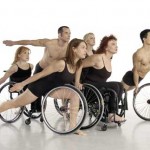Gleeful Controversy

Fox’s hit show Glee has been receiving a lot of media attention – about its May premiere, its diverse (and/or stereotypical) characters, its dark humor, and of course its musical numbers. This week, however, as Glee puts the members of the Glee Club into Artie’s shoes (and wheels), it faces criticism for casting an able-bodied actor in one of the few visible PWD roles on network television.
While many media outlets are emphasizing the charms of Kevin McHale and the show generally, USA Today presented an alternate take. Talking to members of a small union of actors with disabilities, including Chill Mitchell, the author argues that given the reach of television, actors with disabilities need the opportunity to perform in roles that represent their lived experience. Glee‘s executive producer Brad Falchuk described the casting decision as based on charisma, and singing and dancing skills, implying that actors with disabilities who auditioned were simply not good enough – a claim that the Media Access Office and working actors and producers dispute.
Yet, the issues of “crip drag” involved in Artie’s casting are not the only concerning element of the episode. For one thing, Glee missed an opportunity to showcase the fascinating world of wheelchair dancing. In this behind the scenes segment, we see the cast learning their wheelchair routine:
In the New York Post‘s coverage of “Wheels,” the falsity of the performance is highlighted.
Let’s get one thing straight: Kevin McHale, who plays wheelchair-bound underdog Artie Abrams on “Glee,†can really dance.
The implication that he can “really dance” suggests that PWD cannot, and would merely be “pretending” to dance, while his charisma and talents are prioritized, and he only “pretends” to be disabled. Echoing Falchuk’s words, talent is tied to able-bodiedness, and the accomplishments and differences of PWD are discarded.

Wheelchair dancing and integrated dance troupes (with dancers both in and out of chairs) have a long, and beautiful history. There are numerous troupes, choreographers, and performers who specialize in dance with chairs, and who no doubt could have created something truly remarkable and resonant for the group’s performance. For thoughts on the creativity and strength that are part of wheelchair and integrated dance performance, check out Wheelchair Dancer and her links to other dance groups.
In addition to the dancing, however, this episode of Glee raises a lot of interesting questions about access, introduces the character of Becky (a jump rope savant who also has Down Syndrome), and puts its able-bodied characters in wheelchairs for a few hours a day. I was excited about the potential of the first two plots, but deeply nervous about the play-acting with disability. These exercises have a long history, and are well-intentioned, but frequently misfire by convincing able-bodied users that they now completely understand the challenges of PWD. Just as caring for an egg baby can’t replicate caring for a live infant, a few hours and mistakes can’t replicate a life of experiences and struggles. For more of my thoughts on Glee, head over to Antenna, where I’ll be blogging about it again later today!
amanda Klein
What an interesting post! I had no idea that wheelchair dancing existed! Anyway, I have really found myself struggling with GLEE with each new episode. I feel like it is a show that is working reallyhard to be politically correct and edgy at the same, but failing on both counts. I did like how the entire glee club was forced to experience high school life from Artie’s vantage point but all of that was eradicated when Finn applied for a job under the guise of someone with a disability. I think that storyline could have offered a sharp critique of the dismal economy (and certainly such storylines would work quite well in the worlds of CURB YOUR ENTHUSIASM) but in last night’s episode the deception was just a quick fix to Finn’s problems. I also felt that the revelation that Sue’s sister has Down’s Syndrome was a bit trite and tacked on.